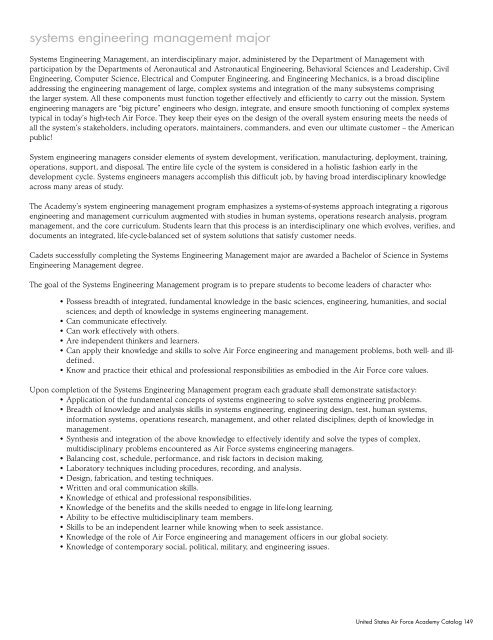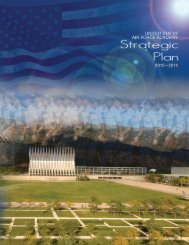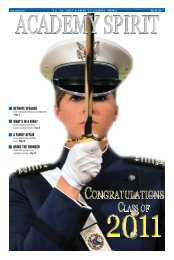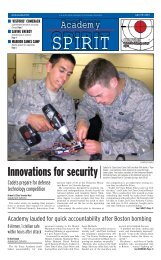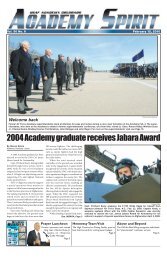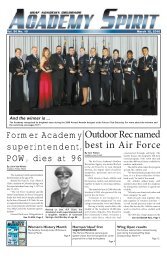2008-2009 Catalog - United States Air Force Academy
2008-2009 Catalog - United States Air Force Academy
2008-2009 Catalog - United States Air Force Academy
You also want an ePaper? Increase the reach of your titles
YUMPU automatically turns print PDFs into web optimized ePapers that Google loves.
systems engineering management major<br />
Systems Engineering Management, an interdisciplinary major, administered by the Department of Management with<br />
participation by the Departments of Aeronautical and Astronautical Engineering, Behavioral Sciences and Leadership, Civil<br />
Engineering, Computer Science, Electrical and Computer Engineering, and Engineering Mechanics, is a broad discipline<br />
addressing the engineering management of large, complex systems and integration of the many subsystems comprising<br />
the larger system. All these components must function together effectively and efficiently to carry out the mission. System<br />
engineering managers are “big picture” engineers who design, integrate, and ensure smooth functioning of complex systems<br />
typical in today’s high-tech <strong>Air</strong> <strong>Force</strong>. They keep their eyes on the design of the overall system ensuring meets the needs of<br />
all the system’s stakeholders, including operators, maintainers, commanders, and even our ultimate customer -- the American<br />
public!<br />
System engineering managers consider elements of system development, verification, manufacturing, deployment, training,<br />
operations, support, and disposal. The entire life cycle of the system is considered in a holistic fashion early in the<br />
development cycle. Systems engineers managers accomplish this difficult job, by having broad interdisciplinary knowledge<br />
across many areas of study.<br />
The <strong>Academy</strong>’s system engineering management program emphasizes a systems-of-systems approach integrating a rigorous<br />
engineering and management curriculum augmented with studies in human systems, operations research analysis, program<br />
management, and the core curriculum. Students learn that this process is an interdisciplinary one which evolves, verifies, and<br />
documents an integrated, life-cycle-balanced set of system solutions that satisfy customer needs.<br />
Cadets successfully completing the Systems Engineering Management major are awarded a Bachelor of Science in Systems<br />
Engineering Management degree.<br />
The goal of the Systems Engineering Management program is to prepare students to become leaders of character who:<br />
• Possess breadth of integrated, fundamental knowledge in the basic sciences, engineering, humanities, and social<br />
sciences; and depth of knowledge in systems engineering management.<br />
• Can communicate effectively.<br />
• Can work effectively with others.<br />
• Are independent thinkers and learners.<br />
• Can apply their knowledge and skills to solve <strong>Air</strong> <strong>Force</strong> engineering and management problems, both well- and illdefined.<br />
• Know and practice their ethical and professional responsibilities as embodied in the <strong>Air</strong> <strong>Force</strong> core values.<br />
Upon completion of the Systems Engineering Management program each graduate shall demonstrate satisfactory:<br />
• Application of the fundamental concepts of systems engineering to solve systems engineering problems.<br />
• Breadth of knowledge and analysis skills in systems engineering, engineering design, test, human systems,<br />
information systems, operations research, management, and other related disciplines; depth of knowledge in<br />
management.<br />
• Synthesis and integration of the above knowledge to effectively identify and solve the types of complex,<br />
multidisciplinary problems encountered as <strong>Air</strong> <strong>Force</strong> systems engineering managers.<br />
• Balancing cost, schedule, performance, and risk factors in decision making.<br />
• Laboratory techniques including procedures, recording, and analysis.<br />
• Design, fabrication, and testing techniques.<br />
• Written and oral communication skills.<br />
• Knowledge of ethical and professional responsibilities.<br />
• Knowledge of the benefits and the skills needed to engage in life-long learning.<br />
• Ability to be effective multidisciplinary team members.<br />
• Skills to be an independent learner while knowing when to seek assistance.<br />
• Knowledge of the role of <strong>Air</strong> <strong>Force</strong> engineering and management officers in our global society.<br />
• Knowledge of contemporary social, political, military, and engineering issues.<br />
<strong>United</strong> <strong>States</strong> <strong>Air</strong> <strong>Force</strong> <strong>Academy</strong> <strong>Catalog</strong> 149


